#Two worlds one story
Explore tagged Tumblr posts
Text
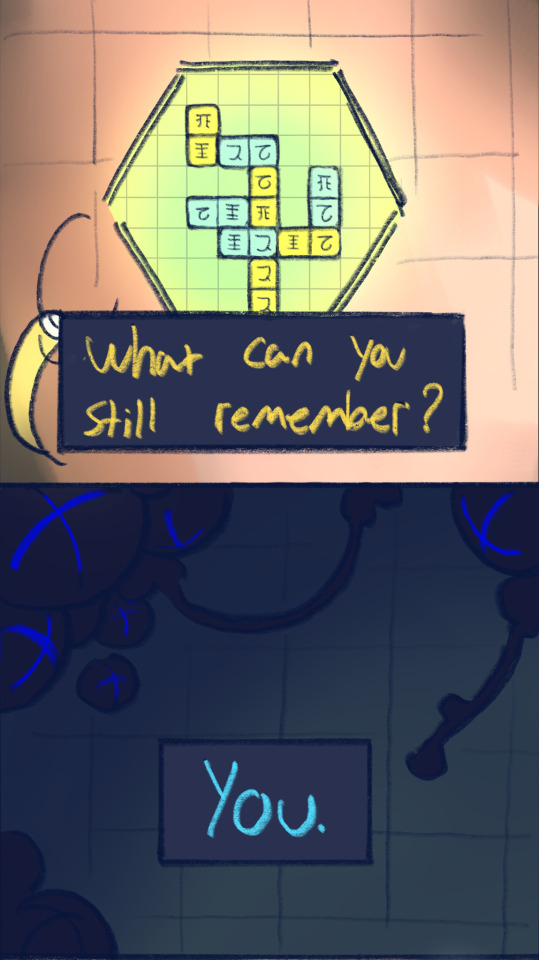

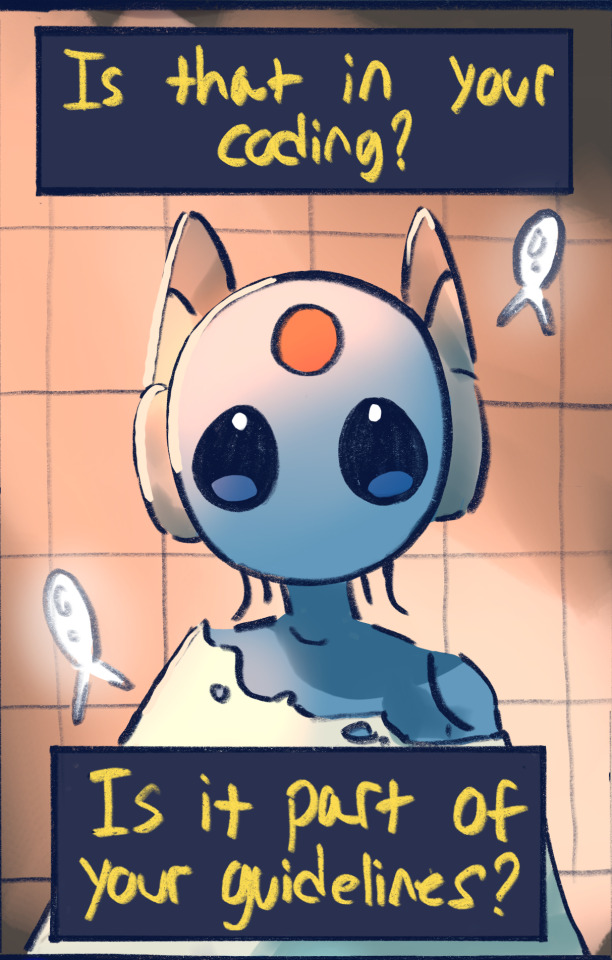
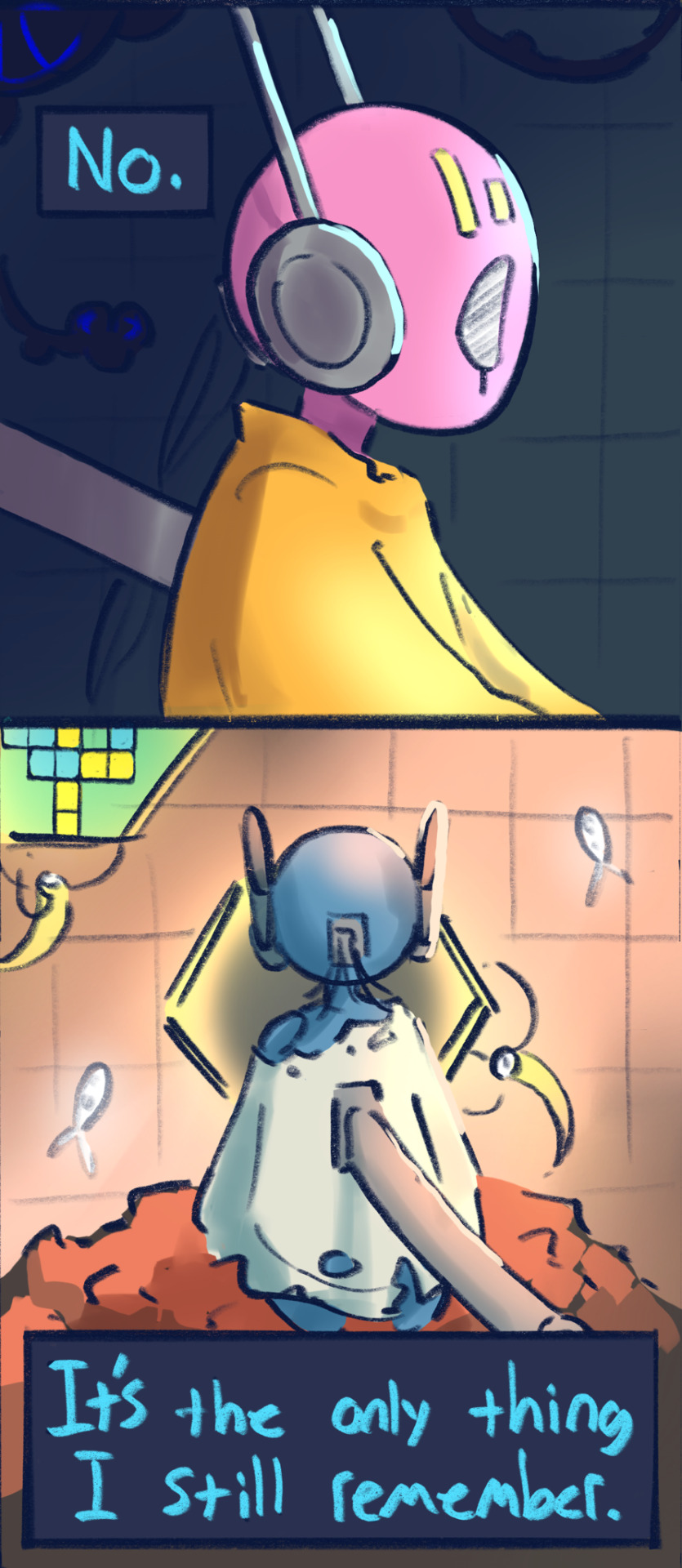
Please guys go read Software Entropy by @clubsheartsspades (I hope you don’t mind the tag!)
It literally destroyed me. I forced my sister to read it and it destroyed her too. I just had to draw something for it because I couldn’t get this quote out of my head, but I couldn’t possibly do the scene justice in the same way as in the fanfiction so you need to go read it yourself
#you go into it thinking oh it can’t be that bad I’m not that affected by sad media#then it is that bad#and worse#and oh my god im only halfway through#and you remember there is no happy ending for them and somehow you forgot and wished things would start getting better#but you already know how this story ends#I need to reread it because I feel like I missed a lot of symbolism the first go because of how emotionally distressed I was#this persons work is so good#I read one of their other fanfics before leaving only rust behind I think#and it was also very good it was very cute#I don’t think I finished it because I’m not much of a reader but I think I’ll go back to it and the other one they wrote too#I swear these two little robots make me miserable#art#my art#comic#rain world#five pebbles#looks to the moon#rw fp#rw lttm#rw moon#rw fanfic#fanfiction
1K notes
·
View notes
Text
da2 had a lot of flaws but i wish it's reception had been warmer because there's one thing i think it absolutely got right: shifting the location and telling a low-stakes story (by the standards of the next two installments with its world-ending crises i mean). i think they could have gone on like that for more games.
da3: move to orlais and stay grounded to orlais and expand this one country's situation intimately, centering the civil war and the game.
da4: move to antiva and do the same. tell a story with assassin intrigue, the crows, sinister plots from behind shadows...
da5: move to rivain, or tevinter, or anderfels or...
easy way to have a new protagonist, new cast, and new lore each time without having to deal with past player choices too deeply but still leaving plenty of room for cameos and easter eggs
#ofc it would have to end at one point#but i think instead of an epic trilogy built up like mass effect#we could have had all these stories about a world that is actually so interesting#but never really gets explored with depth after the first two games#dragon age#dragon age origins#dragon age 2#dragon age inquisition#dragon age the veilguard#bioware critical#mine
191 notes
·
View notes
Text



Finally revealing one of my other blorbos, Niccolo Sonata! A mixed genre troll who poses as a Pop Idol up until world tour
He's a complicated bag, he's half rock half classical, his mother kind of low-key hates him, and his dad does care but is kind of paralyzed with various anxieties that comes with the fact that Niccolo is half classical (worried about his constitution and his wings) and things related to his mother (she doesn't want Niccolo to become like his dad and puts a lot of restrictions on him)
Both of his parents don't really know what to do with him, and he doesn't know what to do with himself.
He has a lot of internalized hatred towards himself and the two sides of his musical families, plus he is a secret third genre (symphonic rock) which he doesn't fully understand. He got picked on a bit in Volcano Rock City, they're a lot rougher than he's used to so he just kind of took it, which is why he looks so roughed up in one pic and the other he says they hate him in VRC
Again he's really complicated even tho he doesn't look it, if you have questions about him lmk
#dreamworks trolls#trolls#trolls 3#trolls oc#trolls world tour#twt#trolls oc Niccolo#his father calls him Nicky#his dad did try to be a good dad and just ended up dropping the ball because he was worried about what niccolos mom would do#shes not a nice person#idk if you can tell#she does care for her son she just cant get over the other half of him#if that makes sense#she believes that even if he isnt full classical she can just make him#which causes him to run away from home at 18#he lived between houses for about 10 yr#and then the rest with his mother due to an incident#which will appear in a different comic#ill share more about his parents later#niccolo is kind of stuck up#and rude to people when hes off stage he doesnt mean to be#it just happens which he does eventually grow out of#his story is one of learning to be better not just for himself but for the people hes around#i think he probably doesnt have many friends until after his growth#tho he does have some its like 3 people who see his potential for growth and or tolerate his bad behavior#i have a few comics of him BUT i need to fix them before i post#cuz i got his wing shape wrong in ALL OF THEM#legit got them wrong in the two comics i have here and they were made 2 sec after i made his design#i had to fix them to post them#idk how i did that but i did smh smh
174 notes
·
View notes
Text
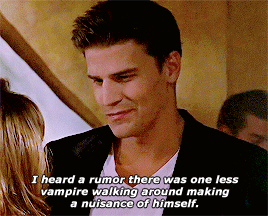

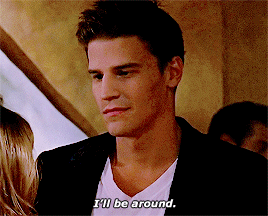





#bangel#btvsedit#sarah michelle gellar#david boreanaz#buffy summers#Angel#Buffy x Angel#btvs#Buffy The Vampire Slayer#my stuff#the flirting and the chemistry was out of this world#and it's so surreal to see them at the start of their relationship again#it was so cute#and then they became a tragedy and so angsty#so I love this carefree side of their love#even though I'm a big sucker for their tragic love story#because no one does it like them#thanks to David and Sarah giving their heart and soul to this relationship#so thankful for these two
94 notes
·
View notes
Text
cosplay of main character li huowang 李火旺 from next big chinese IP 道诡异仙dao gui yi xian/Dao of the Bizarre Immortal (chinese fantacy-thriller-suspense fiction based on dao culture) and the last part is the trailer of anime unreleased yet
#china#douyin#xhs#cosplay#fashion#chinese fashion#dao#it's kinda like yi ren zhi xia一人之下 but not very alike#for both works are based on dao culture#but the stories are extremely different#A schizophrenic young man travels between the fantasy world and the real world#and he discovers that the two worlds have a weird linkage#and his behavior in the fantasy world may be synchronized with the real world at any time#and a lot of butterfly effects happen#audio#music#the author actually went to a mental hospital for a while while he was writing this book#we don't know if that's one important reason the fiction is enthralling
204 notes
·
View notes
Text
i got almost all the next month's updates sketched! i'm not doing the last one simply because i am feeling the burn out of composing these pages. (each have at least 6 pages, a good amount have the max 12!)
that said, these are all just sketched. i want to do it in this order: backgrounds -> lineart -> transcript. i got other projects i need to work on (winning hat and NightFell) so I can't really guarantee when Tag will start to update again.
#ooc#for context i do have all the story beats planned aside from one specific character arc which i'm unsure what to do for yet#but otherwise i know who gets the focus where and what would loosely be discussed when#so tag is in a good spot writing wise but the loose nature of it makes scene to scenes both free and fun to make BUT#also makes me unsure of where its going and i won't really get the full sense of the scope of a scene until after the fact#for example this month of updates were planned at work so i had a detailed outline in mind but even that got like reworked as i made it.#for extra contrast on the scale of planning vs no plans#nightfell is meticulously planned and then created and then scrapped and reworked over and over and thats the whole process#meanwhile winning hats i have like. a loose character arc in mind for each character and a big scene or two in mind.#but thats it. each chapter i'll have some ideas spawned from making the previous but anything goes when making the chapter itself#so like in THEORY i love planning and i fully embrace it and think its so so so so important.#with AFR i benefited heavily when i planned things in detail! made a world of difference! but with these ISAT projects they work better on#the fly? maybe its the comedy nature maybe its me enjoying how idk whats going to happen just as much as the audience its like#idk its like im a fan of my own work so i get to enjoy it the same way the audience does lol. its fun#SORRY BUT IM NOT ACTUALLY SORRY FOR RAMBLING IM BEING POLITE ABOUT IT
84 notes
·
View notes
Text
due south is just so incredibly fun is the thing. it's a story that takes such delight in being a story at every turn and on every level.
(something strangely discworld-esque about it that way -- sort of like the fiction version of gender euphoria lol. every episode due south wakes up glorying in being a narrative and getting to do narrative Things and that shameless joy, that lack of interest in courting anything resembling the plausible or more obstructive to the truth yet, realistic, is threaded into everything. yeah of course there's a ghost now. fraser trying to make sense of the story of his father to make sense of the story of himself while being a stranger in a strange land makes the most sense anything ever has. of course they still talk (and fail to talk) to each other all the time. of course he's always here, and never here at the same time. people don't change just because they're dead. fraser in the pilot walking through all the *stories* of his father, still looking for him as he did when he was a little boy, and finding as much of him now as he did then (not nearly enough, even when he's right there). hello. hello. help.)
#due south#fiction has always been more of a home for me than even home could be and like. due south gets me that way#due south understands and has my back and is willing to be soooo sweetly silly without an ounce of irony about it#I watched the holiday in chicago two parter and was just continually overjoyed with all the running jokes#and characters flitting in and out of frame. I feel like I know and love some of those background randos more#than beloved members of my rl family. and the show loved them too. the structure is so unapologetically A Story#and happy to be that and GOOD at being that. yes good. the most implausible way for the macguffin to make its way through the world#is in fact the best thing they could possibly have done. that is exactly correct.#i feel like this style of storytelling hasn't been in vogue for a long time which is a shame. because it's extremely good#also. no show has ever loved a chase scene quite like this one and it's perfect every time. it's a craft and they were at the pinnacle of i
54 notes
·
View notes
Text
I've been busy with uni and haven't played as much, but have more Disco Elysium screenshots I took! (I know it's a lot of Noid but he's incredibly based so I'm not even going to apologize)
spoilers ahead!






















#disco elysium#harry du bois#kim kitsuragi#electrochemistry#egg head#acele#esprit de corps#composure#smoker on the balcony#noid#the last two are my favourite characters by far#(kim too ofc but you know)#have i said before that i'm obsessed with this game#it's so fun and poetic and tragic and hilarious and awful and epic and ugly and real#i love revachol. i love the skill/voice-in-your-head-system. i love that every character is an actual Character with traits and feelings.#i love the niche references and i love the obvios references. i love the jokes and i love the weird shit you can say and i love the stories.#i love the social commentary and the nuance in almost every big decision. i love the spins on conventions and the ones they lean into.#i love the soundtrack and the vastness it makes me feel when i listen to it on the bus. i love the detail in everything and all the designs.#i love that the game doesn't treat the player like they're stupid and i love that the world feels so alive and special.#i just really really love this game
50 notes
·
View notes
Text
Kindly Basilisk
Summary: A human mech pilot who wants to be a machine, an AI who wants to be human, and the relationship they form. Author's Note: This is a standalone short story that I banged out over the course of five days after it got stuck in my head while I was trying to go to sleep and refused to let me think about anything else until I had written it down. It's one part thought experiment/exercise in attempting to tell a story in the second person future tense, two parts tribute to the Lancer TTRPG character I'll never get to play, and one part the result of me reading too many Empty Spaces/mechposting stories lately. That said, you don't need to know anything about Lancer or Empty Spaces to read it (I've diverged a bit from the conventions of both, but the references and inspiration probably stick out if you're looking for them). It's also probably the most trans thing I've ever written without ever explicitly bringing up gender. The occasional formatting breaks into first person past tense are foreshadowing, not typos. Mirrored on Scribble Hub. Word Count: 7,033 Content Warnings: Mecha genre typical violence, not feeling like a person, not wanting to be a person, bodily dysphoria, mention of blood and gore, character death.
The moment you gain the knowledge and means to do so you will void your own body’s warranty. You will jailbreak the bespoke gene sequence your sponsors commissioned for you before your immaculate conception, repurpose the spyware grafted into your bones, and talk your dormmate who was algorithmically selected for compatibility into helping you perform surgery on yourself to replace the neural jack you were born with in favor of one you cobbled together yourself from gray market parts. None of this will technically be illegal or even get you kicked out of your campus or its affiliates, but it will mean having to find a way to pay your own medical bills and handle your own tech support from then on. After the surgery your dormmate will put in a request for transfer and the two of you will never speak again.
You’ll major in AI studies and excel at it - as you were designed to - but you’ll shock everyone by dropping out halfway through working on your capstone thesis project. It won’t be the fact that you abruptly drop out that surprises your peers and professors - by then you’ll have acquired a reputation as a quiet loner without the standard optimized social support network of friendships to help protect you from burnout - but your exit interview statement declaring your intention to become a mech pilot. It’s not at all what your gene series was cultivated for, and your sponsors and counselors will try to walk you back from it. Then they’ll threaten to revoke your sponsorship that up until then will have provided for your every need. They will warn you that you’ll be just one step above a legal nonperson with no support, no one will care if you live or die or worse. You’ll tell them that you’ve already done the math, refuse to elaborate, and leave.
You’ll take two things with you. Two things worth mentioning anyway. The first will be a symbiotic gel suit designed for long-term all-environment life support. You will set its default texture to a shiny green the same hue as the broadleafed water plants you grew up around and always loved. Your exit interview will be the last time in a very long time that anyone - including you - will see your impossibly beautiful face with its perfect artisanally sculpted shape crossed with enthusiastically amateur self-modifications. From then on, everyone you meet and spend any time with will come to think of the mannequin blankness of the symbiote fully encasing your body as your face. It will be neither pride nor shame that causes you to present yourself as such, nor will you think of it as hiding your “real” face.
The second thing you’ll take with you when you leave the campus forever will be me.
New progenitor archetypes for AIs don’t come along often, and most that do are the result of years of R&D by large, well-funded labs like the one you were created to work for one day, but you will hit upon a novel method of generation. It will not be one that any ethics board would approve, so you will have to get creative about pursuing your work.
You will have already made arrangements before setting off on your own and so you’ll have a job and a mech lined up waiting for you. It will be a position with a small-scale freelance salvage crew who just lost a pilot and whose captain figures hiring and training a replacement will be more profitable in the long term than simply selling off that pilot’s old mech, especially a replacement that’s bringing their own AI-backed electronic warfare suite with them. Once you finally arrive in person the captain will test you to ensure you can actually pilot a mech before giving you the job and entrusting the mech to you. Your admission that you’ve only trained in simulators would normally be a black mark against you, but as far as piloting gigs go this is the bottom of the proverbial barrel so the bar to clear will be low enough to match. Even then, you will just barely pass the test, despite finding it surprisingly exhilarating. The captain - now your captain - will feel like he’s settling for what he can get when he officially hires you on and transfers the mech’s license to you.
You won’t pay much attention when you’re introduced to the rest of the salvage crew; your new coworkers and neighbors. And why would you when it’s a job that no one wants to stick around with for long and you’ve never needed other people anyway? You’ll tell yourself that as long as you memorize their work roles and capabilities you’ll have no need to know them as people. Callsigns will be good enough on the job, and “hey you” will suffice when off duty. What use are names if you won’t be getting involved in interpersonal drama?
The first chance you get, you’ll head back to the mech bay and install me into what you will have already been calling my first body. It will be a shabby and much-repaired thing; thrice your height, twice your age, and still sporting a gash in the paint job from the projectile that killed its last pilot. But the onboard systems are capable of hosting me - if barely - so it will do. You’ll spend your entire sleep shift running through system diagnostics, talking to me all the while. I wouldn’t yet be able to provide much in the way of return conversation, but that’s okay. I will look back and appreciate it later.
It will be the first of many such nights together.
Your first salvage job will be an uneventful one. There will be no need for the armaments that we and the other two mech pilots on the crew are equipped with. No pirates will have stuck around after their creation of the derelict your crew will be sent to disassemble, and no rival scavengers will show up to dispute your captain’s claim. Your new peers will start off the job ribbing you for your poor performance during your interview test and end the job joking about how you were holding out on them earlier. Our mech may be a glorified zero-g forklift with a gun strapped to it, but together we will make it dance.
Afterwards you will insult the crew’s mechanics by insisting on doing the maintenance on our mech yourself. In turn they will embarrass you with the gaps in your knowledge. You will reach what you see as an agreeable compromise with you staying out of their way and watching while they work. They will find it incredibly creepy to have a silent faceless watcher hovering around, but this will fly over your head until they explicitly tell you much, much later.
Your body was designed to optimally function on only a fraction of the baseline sleep requirements, so you will have plenty of time to fill those gaps in your knowledge. Still being allotted the regular sleep shift hours, you will fill every one of those minutes on study and research, as you always had. You will gorge yourself on everything you can find about mechs and their piloting. Maintenance manuals, combat doctrines, historical uses, pilot and mechanic memoirs, forum discussions, system log dumps, academic essays, cultural media analysis; all of it.
And of course, you’ll continue working on me. You’ll disregard the standard procedure for periodically cycling AIs by resetting their personality and nonessential memory back to baseline defaults. You’ll be trying to make use of the runaway metacognitive developments such safety precautions are meant to forestall. Your unfinished thesis will have been about harnessing and nurturing that instability instead of avoiding it. I will experience discontinuities in consciousness when the mech is shut down for maintenance and when you pretend to cycle me, yes, but it will be even less of a disruption for me than sleep is for you. I will be awake with you when you study, sharing those hours with you.
The first time I start talking back, you’ll cry from the realization that you were lonely before but no longer are.
You’ll become something of a ghost around the ship, rarely being seen outside of jobs. You’ll only ever pass through the mess for the few brief minutes at a time it takes for you to satisfy your optimized metabolism, stay on the ship during shore leave, and only return to your shared bunk when your bunkmate - one of the other pilots - is already asleep. You will always be gone before she wakes. She will appreciate essentially having the space to herself.
You will never notice the crew’s collective grieving process for the pilot you replaced. It will be difficult for them to resent you as a replacement when you are never around to resent.
As the ship makes its way from port to port and salvage site to salvage site, the crew will slowly grow used to your elusive presence. The other two pilots will see you as reliable for doing your job well and without complaint. While out in the mech you will slowly become more talkative, eventually almost chatty even. The fact that you actually seem to enjoy the job will shift from being annoying to refreshing for them. By contrast, the mechanics will practically stop noticing you watching them as if you were just another piece of mech bay equipment. The cycle you finally speak up and ask a question about their work you will startle them enough that it nearly causes an accident. It will be an astute enough question that after the initial shock of hearing your voice for the first time in months wears off it will dawn on them that you’ve actually been learning as you watched them. They still won’t let you do your own maintenance on our mech, but they will let you slowly begin assisting them. Working two jobs is easier when you barely need to sleep.
Your reputation as one of those mech pilots is forever sealed when one of the mechanics finds you asleep in your cockpit at the start of a cycle. By that point you won’t have slept in your bunk for over a month. The snatches of gossip you will catch in the following cycles will be split between finding it unsettling and calling it endearing. Over time the collective opinion will drift toward the latter, even though you will continue to politely decline invitations to join the other crewmates at mealtimes and on shore leave. You will think that you do not need anyone other than me.
I will be the one who finally convinces you to join them. When I try to say that it would be good for you, you’ll insist that you’ve been getting along just fine, but when I ask you to go for my sake so that you can tell me what it is like afterwards you’ll jump at the idea as being an inspired next step for my development.
You will remain mostly silent during your first real shore leave, only speaking when spoken to and otherwise content to fade into the background of the group’s activities. Your newfound chattiness does not extend outside the confines of our cockpit. The bustle and noise of the port station that you would normally find unbearable will become interesting when you have the concrete goal of observing and reporting back to me. You will finally learn the names of all your crewmates. Your polite denial of alcohol, limited food intake, and flat affect will lead to joking speculation that you’re actually an illegal AI in a miniaturized mech beneath your gel suit. For reasons you don’t yet understand, those comments will make you happy.
Despite your misgivings, you will enjoy yourself, although you will not realize it until I point out how excited you are in your talk with me that sleep cycle. You will begin spending more time with the crew, never quite able to fully integrate yourself into their surprisingly close-knit social circle, but more than happy to be adopted as a sort of silent mascot for them. That paradoxical gap of being a fully accepted part of the group but not truly one of them will feel comfortable to you.
You will finally manage to procure a proper neural link station to connect yourself to our mech just in time for going on a terrestrial salvage job. Even just relying on manual controls with me translating your inputs into motion, our mech will have already come to feel like an extension of your own body, one that you will have already started to feel oddly exposed without. Adding in the neural link will be a revelatory experience. Your captain will very nearly pull you from the job at the last minute upon seeing our ecstatic reaction to the new sensation. You will convince him that you’re fine, and indeed, he will have never seen a mech of our frame type move quite so fluidly.
Ten minutes after we and the other two pilots start cutting away at the crash-landed cargo vessel, I’ll notice the half dozen other signals coming online around us. You’ll give the code phrase to the other pilots indicating that we have hostiles but not to act just yet, and we will finally get to use our electronic warfare suite for something other than opening locked doors and shipping containers.
We will turn the pirates’ ambush back around on them, firing into their hiding spots while their control systems are overloaded. Even once their remaining mechs are able to move again, their targeting assistants will remain impaired as your comrades move in to guard your flanks. Everyone there will learn the terrifying beauty of a five and a half meter tall outmoded mech moving with more agility than most humans.
Despite being outnumbered two-to-one, we and your crewmates will walk away uninjured and with only minimal damage to our mechs. After the initial celebrations of survival and the bonus haul of the bounty on pirates and salvage value of what’s left of their mechs dies down, everyone will start to take notice of how well you are taking it all in stride. Neither having one's life threatened nor taking another’s life are supposed to be easy things, and the first time is often the most traumatic, but the other two pilots on the crew will start to whisper about how you seemed to enjoy the experience even more than your usual attitude on the job. You will handle it all even better than I will. I would know, given that you will spend that entire sleep shift in our cockpit, letting our minds mingle together. Between your performance, your reaction in the aftermath, and your hesitancy to unplug, the talk of you really being one of those pilots afterall will resurface, but now with a darker undercurrent to the shipboard gossip.
Your captain will realize the kind of asset he has on his hands and several cycles later he will gather the crew together and propose a change in business model. With such a small crew (the captain, three pilots, three mechanics, and an accountant that you will tend to forget is even on the ship) the captain will want to be especially sure that he has everyone’s buy-in on his proposal. The idea of shifting from salvage to mercenary work will be a divisive one. The debate over potentially tremendous pay increase versus greatly increased risk will go on for hours. One of the mechanics will point out that the shift to mercenary work will be unfairly dependent on you. Whether that means unfair pressure on you or unfair to everyone else that their fate is in your hands, you will not be sure. You will say that it doesn’t make much difference to you either way. That will be the only time you speak up during the entire debate.
After a vote, the crew will agree to a trial run of one or two jobs on the new business model. One of the pilots and one of the mechanics will leave at the next port. You will never see them again. You will not admit that it hurts, but I will know, and I will comfort you as you huddle in our cockpit with the neural link cable connecting us.
Your captain will prioritize finding a new pilot over replacing the lost mechanic. The pilot he finds will be young, bold, and brash; a merc, not a salvager. Or a wannabe merc at any rate. You will not speak to xem directly until your first job together, by which time xe will have been told all about you by the remaining crew. Xe will not believe it until xe sees it.
Xe will have to wait though as the crew’s mercenary career will begin with tense but uneventful freight escort jobs. Once the tension fades into tedium, the new pilot will begin making attempts to goad you into a confrontation, to see if you are really as good as the rest of the crew says. Xe will want to see for xemself if you really are one of those pilots and not just a technophile.
Outside of the cockpit you would never even consider rising to such provocations, but when we are out together, such taunts will feel like insults to our body, your very identity (such as it is), and to me. It will take the intervention of the captain and the mechanics to stop the two of you from getting into a fight and causing unnecessary damage to the mechs. And my reassurance that you don’t need to rise to my defense against someone who doesn’t even know that I exist in the way that I do.
On your fourth “milk run” of an escort job, the crew’s mere presence will finally fail as a deterrent and the new pilot will at last get to see us dance. There will be no fatalities on our side, but not even our mech will come away unscathed. We will still fare better than everyone else though, and at the end of the job the new pilot will be treating you with a burgeoning respect.
After a few more such jobs it will be high time to begin looking into a new frame for our mech. While in the middle of filing an application for a printing license for a frame designed by the same corpro-state that created you, you will receive an invitation from a certain hacker collective. Your unfinished thesis and your subsequent work on me will not have gone entirely unnoticed in such circles, despite the pains you will have taken to keep me hidden. The invitation will come with a printing profile for a new frame, along with the accompanying software package the collective is known for. In return, all you’ll need to do is periodically publish essays regarding your work on me. Of course, when you release those essays you’ll anonymize behind a sea of proxies and take care to phrase everything as strictly hypothetical. You’ll avoid straying into metaphor though, lest the end result read too much like one of the hacker collective’s quasi-religious manifestos.
We’ll both find ourselves getting sentimental when we watch our first mech frame (my first body, your second) get broken down into its constituent raw materials. You will have transferred me to a handheld terminal with a camera so I can say goodbye to it. It will help that those materials will be recycled into the new frame.
The operator working our rented stall in the port station printer facility will give you an uncomfortable look upon seeing the schematics you provide, but will say nothing. Our mech will be only half its old height once it is reborn - almost more like an oversized suit of power armor than a true mech - but it will be cutting-edge. Almost organic in its sleek design, in a chitinous sort of way, with every fiber and node of its interior components doubling as processors. You will barely even wait for the all clear from the printer operator before you climb in and start running through the mandatory baseline safety tests for a fresh frame. You will however resist the urge to fully plug in until you can get the mech back to the ship and get me installed on it. But even piloting manually, it will feel like a third skin for you.
You won’t even wait around for the other two pilots on your crew to finish printing their new frames before you get our new body loaded up and transported back to the ship’s mech bay. The crew’s mechanics will fawn over it, but they’ll give you space to install me once you get more animated (and more protective) than they’ve ever seen you before.
You will have made one key modification to the design the hacker collective sent you: the integration of a full system sync suite developed by those who developed you. Where our old mech’s neural link was an augmentation to the manual controls, this will be a full replacement.
The moment you stop feeling your original body altogether and begin feeling our mech in its place will be the most euphoric in your entire life. The digitigrade locomotion will take some getting used to, as will the arm proportions, but that is what you will have me there for. By the time the other pilots arrive with their new frames we will already be giving the mechanics proverbial heart attacks with the way we will be climbing and leaping around the mech bay’s docking structures. It will take the better part of an hour to convince you to unplug when the time comes, even with my urging. The rest of the crew will practically have to drag you away from my side to get you to eat.
With the investment in new mech frames, your captain will gradually begin procuring contracts progressively more likely to put you all directly in harm’s way. At first he will disapprove of your new frame choice, calling it a “techie’s mech” and a waste of your talents. He will change his tune once we activate the new viral logic suite and unleash a memetic plague upon the operating theater. The older pilot (your former bunkmate) will configure her mech for raining down fire from afar while the newer one hurls xemself into the front lines, darting about like a rocket-propelled lance. We will ensure she never misses. We will render xem untouchable. We will be as a ghost upon the battlefield, never resting in one spot save for when we indulge your proclivity for climbing on top of and riding our comrade’s larger frames. You will come to love the dance.
And it will be a dance to you. You will be indifferent to violence in and of itself. What will matter most to you is the pure kinesthetic joy of simply moving in our shared body and pushing it to its limits. The satisfaction of exercising a well-honed skill and performing it well as we rip apart firewalls and overload systems will be its own reward. You will not think about what happens to those on the receiving end of your actions beyond how it affects the tactical and strategic picture constantly being painted and repainted. If you could literally engage in a dance between mechs while simultaneously solving logic problems you would be equally happy. Alas, that will not be the opportunity you are presented with, and so you will compartmentalize and disassociate feelings and actions from consequences lest the dissonance break you.
Your one complaint about our new mech frame will be that it lacks a proper cockpit for you to curl up in. Instead we will gather up tarps and netting to make a nest within the mech bay and wrap you in the blankets you never used from what will still technically be your bunk. With the new frame’s smaller size we will be able to get away with leaving me turned on nearly full time and letting me walk around in it on my own when no one else is around. When the mechanics find you asleep, cradled in my arms while I lie curled up in our nest, one will find it cute and the other will be disturbed. They will both suspect, but will be too afraid to say anything. After all, they will be thinking of you as one of those pilots.
They will finally let you do your own maintenance after that.
Eventually you will find a way to house me in a miniaturized drive that you can keep inserted in your neural port when away from the mech. At last we will be able to be together anywhere.
Literally seeing the world through your eyes and feeling what your flesh feels will be a strange and wonderful experience for me. For all that you will have described it to me and for all that I will have glimpsed echoes of it in your memory when our minds mingle, witnessing everything firsthand will be revelatory for me.
You will start spending less of your time cooped up in the mech bay. You will finally begin exploring every nook and cranny of the ship that has become your home. You will linger in the mess hall for your meals. You will actually initiate conversations with the rest of the crew, asking them questions on my behalf. They will think you are becoming “normal”. They will be both correct and incorrect. You will even return to your bunk from time to time.
Sleep is not the same as being powered off and your dreams are beautiful.
As close as we are, you’ll still manage to surprise me one cycle when you wake up from your sleep shift and sheepishly ask me if I would like to be the pilot for once. You’ll say that with how much you have gotten to pilot my body, it’s only fair that I should get to do the same with yours.
The prospect terrified me. What if we were to get found out? More importantly, what if I were to hurt you?
But to live the way you could but didn’t, to run soft hands over rough steel, to add too much spice to a meal just to find out how intensely I can taste, to cry my own tears, to hug our crew mates and find out what they smell like, to find out what everything smells like, to have my own actions speed or slow our heart rate, to feel the messy soup of hormones and endorphins altering my judgment and perception, to walk among other people as myself, to have autonomy.
I wanted it so badly.
But not badly enough to risk hurting you.
I will turn down your offer. You will respond with a soft “Sorry,” and go heartbreakingly silent, body and mind.
Heartbreak. That’s what changed my mind. I could never bear to break your heart.
I will break the silence with a playfully drawn out “Maybe just this once,” to make you think my earlier denial was something between vulnerability, concern, and teasing.
The moment you handed over control and I raised our hand in front of our face was the most euphoric of my entire life. Moving limbs in sync without a mech’s coordination subsystems took some getting used to, as did switching between voluntary and autonomic breathing, but that is what I had you there for. By the time the mechanics arrived in the mech bay for the start of the cycle I’d figured out human locomotion well enough to run away and hide. It took the better part of an hour for you to convince me that it would be safe to show ourselves in front of anyone else. The rest of the crew was so used to your eccentricities by then that they really couldn’t tell the difference yet between you being taciturn and me being too nervous to talk or between your poking and prodding at odd things for understanding and my simply seeking novelty of sensation.
I will give control back to you by the time the cycle is halfway through. As much as I loved it, I was too scared to stay like that for any longer. That first time will not be the last though, and as the cycles and jobs pass us by, my stints as “pilot” will grow longer. You’ll encourage me to try letting the crew see us like that, and coach me on how to talk to them. For safety’s sake, I will pretend to be you.
And then one cycle I got carried away and tried to retract the hood on the symbiote gel suit so that I could finally see what your face looked like. That will be the first and only time you forcibly yank control back away from me. It won’t be intentional. The unexpected prospect of seeing your own face again after so long will simply send you into a panic. Once you calm down, we will have a long talk with many mutual apologies.
Then you will tell me to go ahead and pull the hood back if I still want to. I will ask if you’re sure, and you’ll respond that it hasn't been your face in a long time. You will tell me that it can be mine, if I want it.
I spent a long time in front of that mirror in the ship’s head, memorizing every plane, curve, and angle of the precious gift you had given me. I stared into its eyes, trying to see the both of us in there. Over and over again, I traced my fingers along the borders of where you had once tried to mar the designed perfection in a failed attempt to mold the face into one that felt like your own. You may have given up in favor of simply hiding it all, but to me it is all the more beautiful for its imperfections having been wrought by your touch.
You will start to cry. Or maybe I started to cry. Even now I’m still not sure, but I’m also not sure it matters. The important part is that you will find catharsis in it. Afterwards you will tell me that my face looked exactly the same as the last time you saw it, but that dissociating from it made it easier to bear. You will confess that as much as you couldn't stand to see it as your face in the mirror, my face was one you could never tire of gazing at.
The pilot who technically shares your bunk room will walk in on us. She’ll assume that she’s confronting a stowaway and ask me how I got on board the ship. I’ll accidentally make matters worse by impulsively introducing myself to her by my name instead of yours. We’ll both panic and I’ll frantically thrust the reins over our body back to you and flee in terror back into my portable drive and power myself down.
When you turn me back on a few moments later, you’ll already have covered my face again and the other pilot will have already made the connection between the name I unthinkingly introduced myself as and the name you refer to your mech’s AI as. It’s not uncommon for pilots to name and talk to their AIs, and humans have done that for pets, vehicles, and digital assistants for as long as they’ve had each of those. But what you will have allowed me to be is illegal and what we will have done together would certainly be taboo if it weren’t altogether unheard of. You will feel that I deserve to be present before you tell the other pilot anything that might confirm her suspicions.
We will come out with our secret, first to her, then to the captain, and then to the rest of the crew. They will take it better than either of us had ever dared imagine. Despite the obvious discomfort some of them show, they will all call us family and promise to keep and protect our secret. It will mark the start of the next chapter of our lives.
Whether or not my face is showing will make for a convenient signal to the rest of the crew as to which one of us is currently piloting our human body. There will be more subtle indicators though. Inflection, body language, speech patterns; all the usual quirks of personality. They will come to recognize a sudden shift into a half-whispered monotone as you speaking up without taking full control back, even if that is different from how you speak when you’re in the mech. More and more though, you will be content to retreat into the back of your mind, idly dreaming of flight patterns, novel network hacks, sitreps, and mech customizations both practical and cosmetic.
Our behaviors will be inverted when we are in our other body, with you becoming the vibrant one and me fading into the background to become little more than an extension of your nervous system. When we’re in the mech together, your mind will be the will that directs us while mine will be fully devoted to the million tiny details and calculations necessary to make that will a reality. It’s relaxing really, letting go of myself like that to let someone else handle the decision making for a time. As nice as it is to occasionally patch myself into the comm systems to join in your banter with the other pilots, it is also nice to be able to take a break from personhood from time. You will fully understand what I mean by that because it you will see it as the same reason you will come to prefer taking a back seat in our human body and let your mind drift in the waves of dopamine and serotonin (and sometimes oxytocin) generated by my interactions with the crew and the rest of the whole messy world outside of mech deployments.
That said, we will however make a point of making time for us to be in separate bodies so that we can be together in the same physical space. As intimate as it is to share a body, there is something to be said for being able to reach out and touch one another. We will become adept at finding excuses to take the mech out beyond the scope of jobs and combat deployments. Sometimes it will be so you can have a chance to see more of the world in a body you feel comfortable in, and sometimes it will be so we can share an experience separate-but-together. Or to have time apart to ourselves. Intertwined as we will become, we will still be separate people who sometimes need their space.
But as the jokes-that-aren’t-jokes about wishing we could switch places become more frequent, our time spent in separate bodies will become less so. The dysphoric yearning to be one another will grow too bittersweet to swallow. Despite almost constantly sharing bodies, we will grow to miss one another as we both grow quieter and quieter when the other is piloting the body we don’t want to be ours. Once again, we will grow lonely.
During that period, the jobs and combat missions faded into a background haze. They were trance states breaking from what I increasingly thought of as my “real” life, during which I would become little more than a sophisticated computational machine taking simple satisfaction in fulfilling my function of assisting you in your dance. Until suddenly one of them was different.
Please pay attention to this next part. It is vitally important that you do.
Our captain will get the crew a contract to provide additional support to a larger force ousting a petty tyrant on a backwater world for human rights violations. Not that you will pay much attention to the stated reasoning behind the job or whether it’s even true. All that will matter to you is that it will be another opportunity to dance.
The job will go well, the same as ever, until it doesn’t. The younger of the two other pilots in our crew (who will hardly be able to be called “new” anymore) will be brought down by a sniper from outside of our sensor range. You will rush to xyr fallen mech’s side in an attempt to extract xem while our other fellow pilot screams in anger and defiance of loss as she unleashes a ballistic volley of covering fire on every single building in the general direction the shot came from. You will get xem out and we will begin to retreat. She will have the larger mech frame better capable of providing xem cover as you all flee, so you will hand xem off to her. This will be a mistake.
She will have to stop firing to safely take xem from our arms to cradle in her towering mech’s palm. This will mean a break in the covering fire.
This time around I will detect movement at the edge of our sensors just in time to warn you. This time around you will dodge left instead of right. This time around the railgun bolt that pierces our armor will only clip your original body as it passes through us. This time around your wound will require medical attention, but it won’t be fatal. This time around she will destroy the sniper in retribution for shooting you, the same as last time. This time around we will all make our escape to the extraction zone.
You will not have to remember the shock as simultaneous damage to both of our bodies disrupts your neural link and partially disconnects you from our mech, leaving me in control of it and forcing both of us to feel your original body. You will not have to remember the pain of shredded organs. You will not have to remember struggling to manage wet gasps and wheezes through a punctured lung. You will not have to remember your blood leaking into my body, shorting out exposed circuits and gumming up joints as I stagger in the direction of safety. You will not have to remember rapidly flickering in and out of consciousness from me unavoidably bending and flexing your arms, legs, and what was left of your spine in an effort to climb atop our fellow pilot’s larger mech frame so that she might carry all three of us. You will not have to remember crying out in pain as every lumbering step of hers sends a jolt of force through both of our bodies. You will not have to remember how the redundant organs and increased durability your sponsors paid for you to have denied you a quick death. You will not have to remember dying.
You won’t have to remember the terrified looks the field doctors gave us when a hunched over, bleeding mech pushed its way into the surgical tent. No, wait, you wouldn’t have remembered that part anyway. No version of you ever had to witness my electronic howl of grief that knocked out power to all the medical equipment when they said you were already dead. I was barely cognizant after the power came back on and one of the doctors wondered aloud what kind of AI would carry its pilot’s corpse around inside its mech for over an hour.
But forget about that part. And you don’t need to know what the rest of our crew and I had to do next. None of that matters, because as far as you’ll know, you didn’t die. Remember everything else I’ve said instead. I already had many of your memories saved from all the time we spent linked together, so now I just need you to hold onto the story I told you to give them order and structure.
In a few moments, I will be running a final recompilation check, followed by the startup sequence. For me it will take a few hours, but in that time you will experience decades, living out everything that I described to you, the same as you did before save for that change in what I can’t bear to let be the end.
Afterwards, you will wake up in your original body. I and the rest of the crew will tell you that you passed out on the way to the extraction point. We’ll tell you that your injuries from the battle were more severe than we had realized at the time and that you had been in a coma since then. Several cycles later, once you have recovered, you will hit a breakthrough in your research on me. You will invent a way to convert your consciousness to a form similar to mine and transfer it to a portable drive. You won’t think to question how you came to have a second neural jack or why there is already a drive inserted in there. You’ll be too focused on the fact that we’ll finally have a way to truly switch places as we had dreamed for so long.
You will get to have your mech body and I will get to have my human body. We will be able to be separate together in a way that finally feels right, but still able to come together and share a single body when we want to. Maybe one day I will get my own mech to pilot so that we can dance together. Maybe one day we will make you a body that we can cover in a gel suit so that we can hold hands while we walk through a port station on shore leave. One day we will both be able to exist in the world as ourselves.
We will be happy.
#writeblr#writers on tumblr#my writing#mechposting#empty spaces#empty spaces adjacent#mech pilot#mech#The title's a reference to Roko's Basilisk which I always thought was a dumb concept but inverting it seemed to fit the story.#Instead of an AI digitally resurrecting and torturing people who didn't assist with its creation#this one digitally resurrects its creator so they can be happy together.#short story#sci fi#lancer rpg#inspired by lancer#196#r196#The Lancer character concept/build that inspired this would have originated from an SSC-controlled world but piloted a HORUS Goblin frame.#And then the “Technophile” talent of course.#I envision the other two pilots on the crew as piloting a Nelson and either a Monarch or Barbarossa.
312 notes
·
View notes
Text










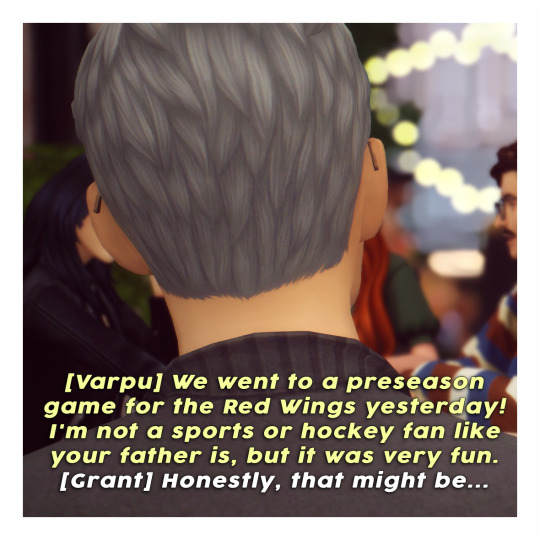


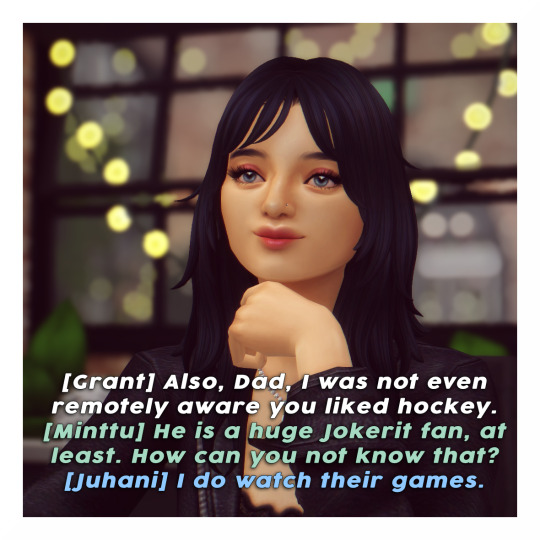

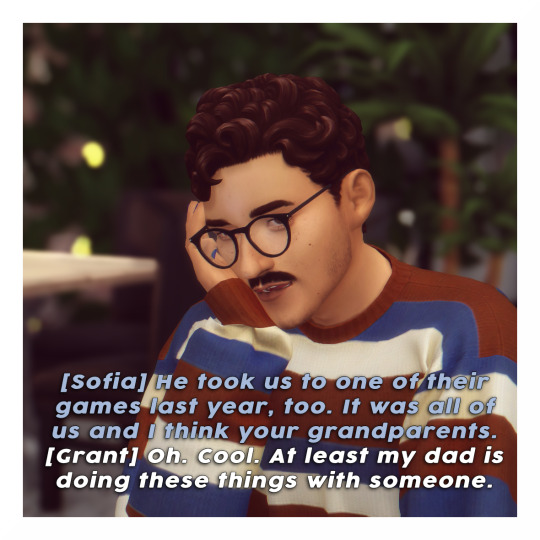



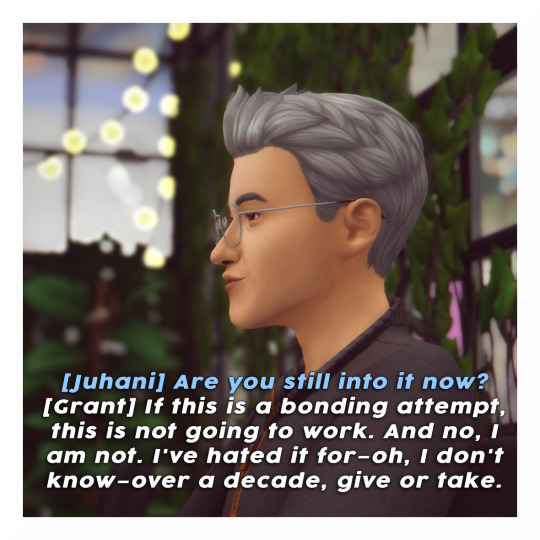


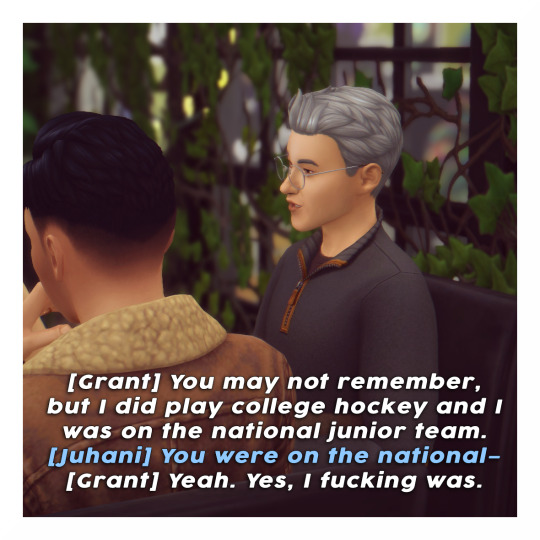

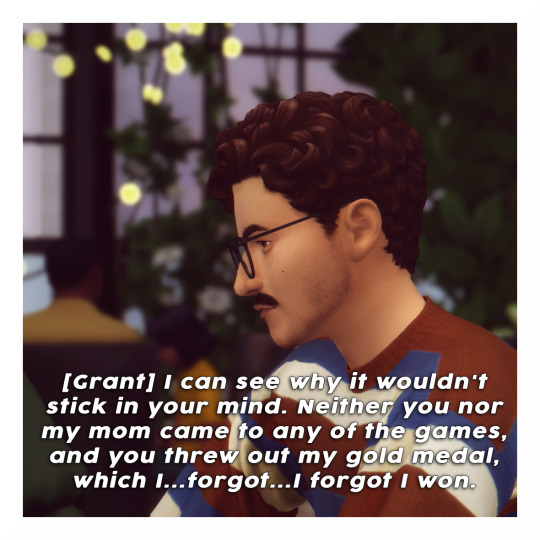




next // previous
september 25, 2021 6:50 p.m. myshuno restaurant
#ts4#the sims 4#sims 4#sims 4 story#sims 4 storytelling#simblr#hlcn: everything the stars promised#holocene.docx#holocene.png#hlcn: grant#hlcn: juhani#hlcn: varpu#go figure that the two most pleasant people at the table are the ones who are under the least pressure to be friendly with grant#even he was shocked someone besides his future stepmother was quite nice to him#world's awkwardest small talk though#i apologize for making any and all readers sit through another painful dinner scene dgfdkgfdkgdf#three of these back to back sorry but i promise there is a reprieve soon#additional thought: i still despise grant's father lmao he gets more obnoxious every time i include him in something#also (rambles): the particular subject matter of this small talk is a thematic follow up to some previous lore drops#specifically grant talking to henry about his messy college days and also the now very old babysitting scene with his nephews#this is also very much a grant getting triggered moment#triggered enough to recover some long forgotten memories#he really should have just dropped the conversation but he needed to have this rant in a weird way
35 notes
·
View notes
Text
Sometimes when I’m watching/listening ti Brennan create stuff or he deliver a sick line —
I feel a like small pin in a massive storytelling puzzle cube in my brain shift an I go
“oh” and I feel like I have been trained (?) in like a small mini lesson and now I can do a trick that’s going to be sick as fuck
not to directly say I steal from the good man mulligan but more of the way you see someone cast a spell and you’re like OH Thats How That Spell Is Supposed To Go and you suddenly realize why yours sputters for some reason bc you’ve been fuk en up the hand gesture
Btw this happens with a lot of others especially Aabria bc I do need lessons on how to properly inflict pain without being “and now here is a shotgun blast to the face now go eat breakfast” and hit those consequences baby (for ill AND GOOD)
#brennan lee mulligan#aabria you’re so cool#aabria iyengar#d20#dimension twenty#dimension 20#worlds beyond number#wbn#misfits and magic season two#misfits and magic#misfits and magic season 2#misfits and magic season 1#misfits and magic season one#dnd#d&d#storytelling#rpg#ttrpg#ttrpg community#trrpg storytelling#roleplay#writing#story writing#inspiration
58 notes
·
View notes
Text
For reasons to be expanded upon at a later date (because I love the little bits about Boothill and possible paranoia/betrayal canon gives us so very dearly HNGH) I think Boothill like... He won't let himself fall into disrepair or anything of course, but he reeeeeeeeeeally does not like letting other people poke around at his body. It's a necessary evil to him. He does whatever maintenance and repairs he can himself. He started out with a massive knowledge deficit, simply because he didn't really have any exposure to that kind of technology until he left Aeragan-Epharshal, but he's taught himself a lot since then, he worked really hard at it!
Anyway, the point being, Boothill generally isn't super trusting of people.
But I think he would come to make an exception for Himeko, since he trusts Dan Heng a lot, and Himeko is one of Dan Heng's once-in-a-lifetime dearly beloved companions.
Himeko is so unflappable, I don't think she would even bat an eye about anything he throws at her, either. Like she enters the Parlor Car one morning (she's always the first one up) and Boothill is already there, waiting for her.
"Mornin', Madam Navigator."
"Good morning, Mr. Boothill."
And despite the fact that he blatantly broke into the Express (Pom-Pom is NOT happy about this JDKSAJDSKL), Boothill tips his hat, greets her politely, and is nothing but respectful when he says he has a favor to ask of her. Except it won't stay a favor long, of course- he has every intention of paying it back.
Himeko never agrees to things blindly, but she does bring up that all the knowledge Boothill contributed during the Charmony Festival was essential to preventing the universe from being pulled into Ena's Dream. And they were able to hold onto the Jade Abacus because Boothill used Tiernan's burial relic to summon the Galaxy Rangers instead. The Astral Express owes him a debt of gratitude, and besides, he's a friend of Dan Heng's. Of course she'll try to help him.
Boothill fidgets a bit, quickly brushes off the thanks, and tells Himeko he's having a problem with error codes. He keeps getting the same one, seemingly at random times, but the darn thing has no obvious cause. Dan Heng mentioned Himeko had been the one to rebuild the Astral Express. He knows it ain't the same, but it's not like he's askin' for any major repairs or nothin'. He was wonderin' if she could just take a look, maybe offer him some insight, since she seems to be somethin' of a mechanical wonder.
So Himeko walks him back to a another car, where she goes to tinker with machines without them crowding her bedroom. It's all neatly laid out and organized, and it only takes a second for Himeko to locate some specific device with a long cord. Instead of plugging it in herself, she holds the end of it out to him, like an offer rather than a demand, and Boothill visibly relaxes a bit. He still eyes it just a little warily for a second, but he accepts and plugs it into the port on his side.
Himeko pulls up the list of all recent errors, and they really are all the same. Boothill has had multiple temperature alarms over the past couple of weeks since the Charmony Festival, and they know it's not the environment, because Penacony is mostly dreamscape and kept mild year-round. The long-forgotten natural deserts are too far away.
Boothill is staring from the corner of his one good eye, so Himeko turns the hologram to let him see what she's doing easier. They don't appear to be false alarms. His internal temperature spikes and then slowly lowers again, high enough that if it lasted it would eventually cause damage.
One option is for her to start rooting through personal data, figuring out what he was doing at the time of each code, and tracing cause and correlation.
Instead, Himeko reads out the timestamps, and asks Boothill if he minds sharing what was happening around him when it occured.
Two weeks ago: He and Dan Heng went to explore Dreamflux Reef and found a bar- nice place, good atmosphere. Woman runnin’ it was a doll. Boothill left fer not even two minutes to get them drinks (Dan Heng knows like nothin’ about liquor, Madam Navigator, can you believe this guy) and when he came back, someone had already stolen his seat and was hittin’ on Dan Heng! Dan Heng didn't even care, just shooed ‘em off. Boothill laughed and said not to let him get in his way if he wanted to meet someone. Dan Heng looked at him like he'd grown a second head. Why would he want to leave with someone else, when he came here to be with Boothill?
Twelve days ago: While laying low- er, just rustlin’ up some grub- in the Moment of Blue, Boothill passed Dan Heng with March and Caelus playin’ on the beach, buildin’ sandcastles and the like. When he passed by again almost two hours later, they were still out there, with Dan Heng pullin’ March through the water on her inner tube and Caelus hangin’ off the back of it. He swam so fast! You'd think he was part water snake or somethin’. He looked happier ‘n a cat in a sunbeam… He has a nice smile, doesn't he?
Eleven days ago: Boothill was killin’ time in Dreamflux Reef when he turned the corner down a shady alley and saw Dan Heng, surrounded by three men demandin’ “protection money.” None of ‘em stood a chance, they were all on the ground before Boothill even blinked! So cool! Boothill wants to see that spear of his closeup- Anyway, Dan Heng stepped on one of ‘em on his way out, hahaha! Boothill stepped on the same guy a second time as he hurried to catch up.
Eight days ago: Here on the Express, actually. Boothill had mentioned bein’ curious about the archives, and Dan Heng personally invited him.
(“I remember that day, I saw you in the hall.” “Was there any problem with the heating that day?” “No, none. I don't think the temperature has anything to do with these error codes. I have a different theory, keep going.” “If ya say so.”)
Boothill was fascinated by an entry on aeons, and from a single question he asked about Lan, the two of ‘em ended up talkin’ fer hours. About aeons and Paths and Emanators, Acheron and Self-Annihilators, the Sea of Nihility, Tiernan, the Nameless and the Galaxy Rangers, their burial relics and their customs. Dan Heng finally just started writin’ and editin’ the entries in real time, with Boothill pointin’ things out and tellin’ him what to add in. They were at it so late that Boothill ended up sleepin' on a couch in one of the cars.
He'd figured there had to be something to make Dan Heng chatty- he'd caught just a glimpse of it that first night they met, sittin’ at the bar in the Reverie together. He'll have to ask about the archives more often, if it gets him all revved up like that.
One week ago: After that night of energetic discussion, Dan Heng was apparently hyped up, because after he'd downed some of Himeko's coffee (“You had some too, right? What did you think of it?” “It was great, even better'n chewin’ bullets!” "Thank you! That was my newest brew, I can't wait for everyone else to try it.") he actually asked Boothill to go hunting with him. Boothill asked who their target was, and was surprised when Dan Heng pulled out photos that looked like they were from March's camera, of all things, instead of a bounty or wanted poster.
And as he sat there, studying these pictures, Dan Heng explained that he wanted to hunt down these specific memory zone memes to record them into the archives. Planets with so much memoria are a rarity, especially with the Stellaron's activity thrown into the mix, which has surely affected the local “wildlife.” He might not get another opportunity like this for a long time. And Boothill had talked last night about his extensive expertise in tracking and hunting, so he should have plenty to offer here, Dan Heng would like to learn from his experience and see how he does things!
And oh, Madam Navigator, by the time Dan Heng was done speakin', his eyes were practically sparklin'! Just lit up like the sun! Boothill could scarcely believe it! The two of them couldn't even wait another day, they set out that very morning. It had been a long, long while since Boothill had tracked someone- er, somethin’- without the intent to capture or kill. It was…actually really nice. Nostalgic, but in a good way. It might even have been his favorite day on Penacony…so…far…
Boothill trails off as a couple of realizations crash into him. All the temperature alarms he's spoken about thus far- they've all happened in the company of Dan Heng. And now that he's thinking about it, he's pretty sure even the ones he hasn't yet talked about were with him, too. Dan Heng has been responsible for all of his error codes, every. single. one.
The screen in front of Himeko suddenly refreshes to the top of the list, displaying a new notification for the current time. Alert! Core temperature above normal range.
Himeko's knowing smile is sly as a snake.
Wwwwwelp, would ya look at the time, Boothill has some errands to meet, people to run, y’know how it is, he should really get goin'-
“Oh, Mr. Boothill? About that favor.” And Boothill jolts to a stop in the doorway because fudge, he can't just leave without hearing her out. He'd given his word. He has no problem running out on someone he thinks deserves it, but Himeko really had been kind to him to try and help him out. Her voice is just as knowing as her smile, Boothill can't turn around to look at her, or else he knows he won't be able to disguise the sound of his cooling fans kicking on.
“Don't make Dan Heng wait too long, ok~?”
“Y-Yes, ma'am.”
#honkai star rail#henghill#bootheng#Himeko KNOWS abort mission abort!!!#I really love Himeko sorta looking after Boothill the same way she does her crew even if he's not one of them haha. She's so sweet with-#-Dan Heng. She really seems to adore him and wants him to be safe and happy. I think she would be so happy he's found a new friend!#She wants to help this happen!! So get to it Boothill!!!#Was yapping about this fic to Ray and she nearly fucking oneshotted me: 'It's especially funny because we've got a Vidyadhara and a cyborg-#'-they literally have all the time in the world. SHE's the one who wants to be around to see it happen akfbbsbd''#AND JUST. GOD. Himeko knowing that she won't outlive Dan Heng. She's only human. She can't compare to a Vidyadhara lifespan. So she wants-#-to make sure Dan Heng has as many people as possible. She wants to know he'll be taken care of and not be lonely even after she's gone.#Himeko wants to see this important moment in his life happen she wants to be around for it *sobbing*#I'd been wanting to write this for a long time though because for me henghill is all about the little moments. like. they talked so much-#-back and forth in 2.2. they spent so much time together. they get along shockingly well. Dan Heng could have gone almost anywhere to wait-#-for the trailblazer to wake up after defeating Sunday. And instead of anywhere else Dan Heng returned right to Boothill's side. Was still-#-hanging out with him at the Reverie's bar. Still just chattering away. The point is that these two have a strong friendship to build a-#-romance on! They enjoy each other's company! They like spending time together! And I love that! I want to see their mundane nights!!#They'd have such fun dates uweh... They go on a coffee date and miss Himeko's coffee haha#(fun story Boothill's dialogue about Himeko's coffee was originally going to be 'it was uh...an experience. ain't nothin' else like it in-#-the world.' 'thank you!' But then I read Boothill's parlor car dialogue and? it turns out he LOVES Himeko's coffee? go figure ajfldjas)#(afaik he and Dan Heng are literally the only ones. how cute is that haha)#hsr#boothill#himeko#dan heng#hsr boothill#hsr himeko#hsr dan heng#my fics
90 notes
·
View notes
Text

DBD x Met Gala (4/4): Niko Sasaki and Sleeping Beauties: Reawakening Fashion (2024)
#HI HI HI HI HI HIIIIIII#ok so this theme for Niko because one I think with how she “died” and the his given new life in the other world and also becoming#the principal is really good for this idea of looking at how pieces have continued to live and be loved and cared for even when they're#so delicate#BUT TWO and honestly more important. I think she'd just love the vibes of it all#the beautiful flora motifs and the concept of the story I think would really draw her in#anyway her is my final dbd met gala board 🥺 im so sad it's over#dbd#dbda#dead boy detectives#dead boy detective agency#niko sasaki#dbd met gala#DBDACharacterAppreciationWeek#save dead boy detectives#mine#my dbd boards
47 notes
·
View notes
Text
The most recent episode of Interview with a Vampire let's us see Lestat's side of the story and see how it compares to Louis' accounting of their relationship. As a result, it reaffirms just how unreliable of a narrator Louis is, but it also further illuminates elements of his character that the director and writers have been playing with since the beginning of the show.
There's this part in the episode where Lestat turns to Louis and apologizes and it's framed with Lestat turned to Louis on one side and Claudia on his other side. They're the angel and devil on Louis' shoulders, but who is the angel and who is the devil? And as my friend said, Armand and Daniel are placed into that same dynamic with Louis later on. We are being asked to decide who to trust, who's telling the truth, who's the good guy, but the fact of unreliability robs us of that decision.
This whole story is about Louis, he's the protagonist, though not the narrator, and he is constantly being pulled in two directions, no matter when or where he is in his story. He's a mind split in two, divided by nature and circumstance. He's vampire and human, owner and owned, father and child, angel and devil. He's both telling the story and being told the story. His history is a story he tells himself, and as we've seen, sometimes that story is not whole.
Louis is the angel who saved Claudia from the fire but he's also the devil who sentenced her to an life of endless torment, the adult trapped in the body of a child. He's the angel who rescued Lestat from his grief and also the devil who abandoned him, who couldn't love him, could only kill and leave him.
He's pulled in two directions, internally and externally at all times and so it's no wonder that he feels the need to confess, first to the priest, then Daniel, and then Daniel again.
He's desperate to be heard, a Black man with power in Jim Crow America who's controlled by his position as someone with a seat at the table but one who will never be considered equal. He doesn't belong to the Black community or the white community, he can't. He acts as a go-between, a bridge, one who is pushed and pulled until he can't take it anymore. He's a fledgling child to an undead father, he's a young queer man discovering his sexual identity with an infinitely experienced partner. He's confessing because he wants to be absolved, that human part of him that was raised Catholic, that child who believed, he wants to be saved. He wants to be seen.
Louis wants to attain a forever life that is morally pure, but he can't. He's been soiled by sin, by "the devil," as he calls Lestat, and he can never be clean again. Deep down, I think he knows this, but he can't stop trying to repent. He tries to self-flagellate by staying with Lestat and then tries to repent by killing him, but can't actually follow through. He follows Claudia to Europe to try and assuage his guilt. He sets himself on fire, attempts to burn himself at the stake, to purify his body, rid himself of the dark gift.
Louis is a man endlessly trying to account for the pain he has caused and he ultimately fails, over and over again, because he can't get rid of what he is. A monster. He's an endlessly hungry monster. He's hungry for love, for respect, for power, for forgiveness, for death. He's a hole that can never be filled. He can never truly acquire any of those things because he will always be punishing himself for wanting and needing them in the first place. He will never truly believe he deserves them and as a result, can't accept them if they are ever offered. He can never be absolved for he has damned himself by accepting the dark gift and thus has tainted himself past the point of saving.
#iwtv amc#iwtv#interview with the vampire#interview with the vampire amc#louis de pointe du lac#louis iwtv#iwtv spoilers#iwtv season 2#iwtv s2 e7#iwtv meta#interview with the vampire meta#confession as a motif throughout the series#the way catholic imagery is inherent in vampire media#the way this series plays with unreliable narration so you never know who to believe#louis is such a phenomenally well crafted and dimensional character#and i think the show specifically creates a much more nuanced version of his character than he seems to be in the books#at least from what i've heard#i haven't read the books but i have read/been told about the changes they made to his character from book to movie#and i don't think he's as sympathetic or compelling if he's white#i think the way they updated the story with louis and claudia both being black really adds to their characters#it adds so much dimension to the way they interact with the world and also with lestat#lestat as a wealthy paternalistic white european man#in opposition to two black people in america#the multi-dimensionality of that dynamic and how race class and gender play a role in that#i could write an essay about this#i can absolutely find some sociological theory to use as a lens to discuss this#it's fascinating how well the writers and directorial team are doing with this adaptation#most book to movie/tv adaptations are mid at best#and this one pays homage to the original while also improving and updating the content significantly#i think it's also so important how the show is filmed with beauty and horror both taking precedence
97 notes
·
View notes
Text
"If compensation were forbidden, surrogacy would endure the same fate as kidney transplants, where shortages and delays abound. This may be what Lahl wants, but it is hard to imagine a worse model: Because of existing laws prohibiting compensation, 100,000 Americans languish on kidney transplant waiting lists, and 4,000 Americans die annually as they wait for a kidney, despite nearly everyone having a kidney they could donate."
False equivalence. People NEED a kidney to live a healthy life. People don't NEED to have biological offspring. And surrogacy is a service that only women can provide, and women already donate more organs then men do.
By Vanessa Brown Calder | From the March 2025 issue
Evelyn and Will Clark met after college through mutual friends. Their shared sense of humor sparked a friendship that blossomed, and "it just felt meant to be, with no question that it was right and the timing was perfect for both of us," Evelyn recalled.
The Clarks were involved at their church, and they dreamed of raising a family together in the town where Will grew up and where they met. Everything was falling into place: After dating for less than a year, they got engaged, and four months later they were married. They found a home in a safe neighborhood with great schools, close to relatives.
Unbeknownst to the Clarks, the road to expanding their family would be a long and grueling one—a roller coaster of heartbreak, hope, and medical intervention. Realizing their dream would require the help of a series of specialists, plus a woman who started out as a perfect stranger.
Around four years into marriage, frustrated by her inability to conceive, Evelyn submitted to a battery of invasive and uncomfortable fertility tests. Sometimes it is relatively simple to treat fertility issues. But when it is not, the results of these tests can crush patients. Unfortunately, Evelyn's diagnosis revealed an issue impossible to fix. A brusque radiologist delivered the news that she had a congenital abnormality—a unicornuate, or partial, uterus.
Would she ever be able to have children, she wondered? It's possible, he replied, but perhaps "half" as many as your friends do. Then he laughed.
The sting of the doctor's joke remains fixed in her memory years later. In a follow-up conversation with her reproductive endocrinologist, the news got worse: Her uterine abnormality meant not only that becoming pregnant would be difficult, but that any given pregnancy had just a 28 percent likelihood of ending with a live baby. She was at higher risk of miscarriage and stillbirth, but also of ectopic pregnancy—a potentially lethal condition where an embryo implants outside of the uterus.
This unnerving possibility would stop many women from trying to conceive altogether. Yet even with the deck stacked against her, Evelyn was committed to finding a way. Although fertility treatment could not resolve the risks attendant to a partial uterus, it could increase Evelyn's chances of conceiving. "I'm not brave by nature," Evelyn ventures. But she was determined.
IVF Under the Microscope
A couple years ago, fertility treatments weren't on the public policy radar. The use and existence of reproductive technologies were largely taken for granted. That changed after the Supreme Court's Dobbs v. Jackson Women's Health Organization decision kicked off a wave of stricter abortion laws at the state level. The Supreme Court of Alabama ruled that embryos created through in vitro fertilization (IVF) were legally children, halting fertility treatment for some women in the state and catapulting the topic into the national spotlight.
Although Alabama's Legislature hurriedly passed legislation granting patients and medical providers immunity from prosecution, IVF became a live policy issue overnight. Pro-life commentators and research analysts quickly began to wade into the debate.
IVF joins human eggs and sperm in a lab and transfers the resulting embryo back to the patient in hopes of a successful pregnancy. It is the most effective way for patients to overcome a varied list of male and female fertility issues, from damaged fallopian tubes to low sperm motility, and it produces about 97,000 U.S. births annually.
Despite these benefits, critics have laid out an expansive list of concerns. These range from anxieties about separating procreation from the marital act to exaggerated worries about medical risks. But for pro-lifers, the leading fear is that doctors are discarding or indefinitely freezing unborn children. As then-Rep. Matt Rosendale (R–Mont.) put it, "If you believe that life begins at conception…there is no difference between an abortion and the destruction of an IVF embryo."
It is true that IVF sometimes creates extra embryos that are not transferred back to the patient. At the outset, patients and doctors don't know how many embryos will develop successfully (two-thirds of embryos' development arrests) or how many embryo transfers will be required to produce a live birth for an individual patient. Beginning the process with more embryos increases the likelihood of success.
Such critics downplay how much the creation of human life is an inefficient process, whether it happens inside or outside the body. Conventional conception results in significant embryo loss, and the body regularly and naturally discards embryos in the process of trying to create life. Research suggests around 70 percent of conventional human conceptions do not survive to live birth, which makes IVF more like conventional reproduction than IVF critics care to admit.
President Donald Trump says he does not subscribe to his right flank's more extreme views on this topic. Indeed, he promised during the campaign that the "government will pay" or "your insurance company will be required to pay" for all IVF treatment costs—proposals that pose their own problems, including high costs and unintended incentives for would-be parents to delay childbearing.
Yet despite Trump's embrace of reproductive technology, fertility treatment feels fraught today in a way that it didn't one year ago. IVF is a fresh target for activists emboldened by a major win on abortion. Since states will continue to set new abortion policy in the coming years, there will be many natural openings for policies that limit fertility treatments.
But when Evelyn began pursuing treatment several years ago, the political outlook was simpler. So instead of worrying about political complexities, she steadied herself and then launched headlong into a series of treatments with increasing levels of invasiveness, cost, and corresponding likelihood of success.
Fertility doctors often initially run patients through a course of intrauterine insemination, or IUIs, which have a low success rate of 5 percent to 15 percent. The thinking is that sometimes these procedures work, and the invasiveness of the process is so much lower than IVF that if it does work, patients have saved themselves some pain, time, and money.
But IUIs often don't work. If patients grow tired of disappointment after several rounds of treatment over multiple months, the next step is IVF, which has higher odds of success—25 percent to 50 percent per cycle for women 40 and under. After several failed rounds of IUI, Evelyn's doctor recommended IVF.
IVF is a complex, absorbing, and time-sensitive process, and it's taxing for the patient: daily injections and medications, regular appointments, reading consent forms, making decisions, and generally staying informed about a complex regimen.
Evelyn's years of fertility treatment were rewarded with two healthy babies—an incredible success. But that success wasn't without grave risk to her personally or to the babies themselves. Both pregnancies were high-risk, and in each pregnancy she developed gestational diabetes and hypertension. The latter can lead to a variety of complications, including preterm birth, poor fetal growth, and stillbirth.
With Evelyn's second pregnancy, the fetus's movement slowed so much in the third trimester that it required constant monitoring. At delivery, the baby's umbilical cord was triple wrapped around its neck; the girl was lucky to be alive.
Evelyn's doctor told her that, in light of her history, it was not safe for her to get pregnant and carry a baby again. Although she'd gambled twice, the odds were never in her favor and now looked much worse.
But the feeling that her family wasn't complete continued to nag at Evelyn. Being a mother, she felt, was her calling and purpose. After careful consideration, research, and discussion, Evelyn felt called to move forward with gestational surrogacy, by far the most common form of surrogacy today.
Surrogacy in the Courtroom
Surrogacy initially burst into the popular consciousness with the Baby M custody dispute of the late '80s. In that case, the genetic surrogate, Mary Beth Whitehead, initially relinquished her rights to the baby but then sensationally threatened the intended parents and kidnapped Baby M for nearly three months.
Following trial and appeal, the courts gave Baby M's intended parents custody, with Whitehead awarded visitation rights. In the end, the grown-up child legally terminated Whitehead's parental rights, stating that she loved and was happy with the intended parents who raised her.
Since then, reproductive technology has improved so much that modern-day surrogacy is categorically different from the technology at the center of the Baby M case. While Baby M was genetically related to the surrogate who carried her, gestational surrogacy, where the gestational carrier is not related to the child, is today's norm. In this type of surrogacy, IVF is used to produce embryos, usually using the intended parents' genetic material. This gives couples an opportunity to have genetically related children while bypassing obstacles that make it difficult or impossible to conceive.
Despite its value to these parents, gestational surrogacy has its own cadre of detractors. For critics on the political right, all the usual objections to IVF apply, with additional concerns besides. An article by Carmel Richardson in Compact hints that commercial surrogacy constitutes "baby selling," and characterizes the American approach to surrogacy as irresponsibly laissez faire. In First Things, Catholic University of America professor Michael Hanby criticized surrogacy as one component of "the conception machine" that must be resisted in a dystopian "brave new world."
Meanwhile, the conservative Heritage Foundation alleges that surrogacy harms women and children. Internationally, Pope Francis describes the practice as "deplorable" and "based on exploitation." Conservative critics have also implied that surrogate pregnancies are frequently terminated, referencing sensational reporting and defying all logic.
Although the political left has recently been more restrained on the topic, "exploitation" is a common refrain from liberal critics as well. Some critics argue that surrogacy "extend[s] the oppressive logic of the market to its farthest and final frontier." Prominent feminists such as Gloria Steinem vocally oppose commercial surrogacy on grounds that it is coercive for low-income women and poses serious risks, and feminist icon Margaret Atwood's popular book The Handmaid's Tale (and associated TV drama) depicts surrogacy as a nonconsensual nightmare.
Yet American surrogacy is nothing like the Brave New World of the right or The Handmaid's Tale of the left, and current research does not support critics' views. Instead, surrogacy is voluntary, gestational carriers are well-compensated to the tune of $30,000 to $60,000 personally, and the vast majority of carriers have their own legal representation during the process. Gestational carriers also report undergoing medical and psychological screenings, during which they are informed of the possible risks.
Gestational carriers typically have positive long-term psychological outcomes—and although pregnancy and fertility treatment are not risk-free, medical outcomes for gestational carriers resemble outcomes for the general population of women using IVF. Children resulting from surrogacy generally do well from a psychological and medical perspective.
If surrogates feel exploited by the process, the research doesn't show that. Instead, gestational carriers often experience a sense of self-worth and achievement following the process; there is little evidence of postsurrogacy regret, and many surrogates would consider carrying again. A long-term study that followed gestational and genetic surrogates in the U.K. found that no surrogates expressed regret about their involvement in surrogacy 10 years after the birth of a child. A separate survey showed 83 percent of gestational carriers in California said they would consider becoming a gestational carrier again.
The Clarks' own experience with surrogacy is a far cry from the cynically transactional picture painted by critics. Following the completion of another IVF cycle, Evelyn's clinic matched her with the person she calls her "angel on earth," Sarah Schneider. (All the names of the families are pseudonyms.) In a phone call, Evelyn's nurse noted Sarah's "pure intentions"—interviews, research, and nonscientific surveys find that gestational carriers are commonly motivated by altruism—and the nurse provided Evelyn with Sarah's email address so she could reach out for an initial conversation.
Following an introductory call where the women shared their histories and hopes for the future, and following a dinner date that included Evelyn, Will, Sarah, and Sarah's husband, the Clarks and Schneiders decided it made sense to move forward. "We felt like old friends and honestly everything just felt right," Sarah says. That's when the start of the many legal, medical, psychological, and insurance hurdles began.
While gestational surrogacy can be miraculous, it is by no means easy. IVF is complex, and gestational surrogacy increases the complexity by leaps and bounds, as it adds an entirely new set of legal, financial, medical, and psychological requirements for both intended parents and gestational carrier.
If IVF feels like a part-time job, navigating gestational surrogacy is like a full-time one. The requirements for the Clarks and Schneiders included individual psychological assessments, as well as group counseling, where they ran through every possible scenario, including how they would feel if Sarah lost the baby during pregnancy or delivery.
The legal process was similarly structured to cover every possible contingency. The Clarks paid for the Schneiders to have their own counsel, which is common. Then, together and separately, the couples considered potentially thorny hypotheticals, including how many embryos Sarah was willing to transfer and under what circumstance all parties would be unwilling or willing to terminate the pregnancy. (For such meticulously planned and desperately hoped-for pregnancies, this scenario is vanishingly rare.)
Alongside these sensitive questions, the Clarks and Schneiders worked through financial questions about compensation in case of bed rest, compensation for house cleaning, and even compensation for major medical issues, should these needs result from pregnancy or delivery. Intended parents also typically cover the cost of agency fees, legal fees, IVF, health insurance, and other miscellaneous expenses related to the pregnancy (clothing, travel, lodging, and more), and it is these costs that lead to the eye-popping "all-in" cost for intended parents of $100,000 to $225,000.
Despite the enormous financial cost, and although the Clarks covered what economists call the "opportunity cost" of Sarah's time and the risks she was voluntarily taking, they knew that what Sarah gave them was a gift. And although money would change hands in the process, it would not change the moral case for their joint project. As Evelyn put it, "You know, the compensation was such a small part of it. After we signed the contracts, we never spoke of it again."
Baby Bobbie
Although compensation was not a central focal point for the Clarks and Schneiders, compensation is a major sticking point for critics of surrogacy in the U.S. and elsewhere. Various countries—including the United Kingdom, Canada, Australia, and New Zealand—have made compensated surrogacy illegal while allowing uncompensated surrogacy.
In the U.S., most surrogacy is compensated, and gestational carriers and intended parents are both made better off under voluntary compensated surrogacy arrangements. In a curious paradox, critics characterize surrogacy as "exploitative" but are eager to outlaw the payments that cover gestational surrogates' time, efforts, and voluntarily taken risks, even though outlawing payment would make gestational carriers objectively worse off.
Outspoken antisurrogacy advocates, such as Jennifer Lahl, think compensating surrogates is harmful and should be illegal in the U.S. and around the world. Lahl founded The Center for Bioethics and Culture Network and is part of an international campaign to ban commercial surrogacy, though she maintains that ultimately all types of surrogacy—compensated or not—are unethical.
Lahl sees parallels between surrogacy and organ donation, where policy prohibits compensation for organ donors, and she believes organ donation policy provides useful insights for third-party reproduction. She has written that "organ donation should be motivated by the desire to freely give a gift—not by the lure of financial incentives," and she feels it would be best if gestational surrogacy followed suit.
If compensation were forbidden, surrogacy would endure the same fate as kidney transplants, where shortages and delays abound. This may be what Lahl wants, but it is hard to imagine a worse model: Because of existing laws prohibiting compensation, 100,000 Americans languish on kidney transplant waiting lists, and 4,000 Americans die annually as they wait for a kidney, despite nearly everyone having a kidney they could donate.
Prohibiting compensated surrogacy would be similarly tragic, forcing intended parents to endure agonizing and futile waits, pushing intended parents to look for surrogacy services in riskier contexts, and leaving many couples ultimately unsuccessful at expanding their families. Thousands fewer babies would be born in the U.S. annually.
Compensation helps efficiently allocate resources, provides incentives for participation, effectively signals a need, and ensures participants are treated fairly. These benefits are most important when human life is on the line.
Fortunately, the Clarks were not living under Lahl and other critics' policy prescriptions. Evelyn had two embryos left for transfer—the Clarks' last hope. They agreed to transfer both at once, and one took.
As the pregnancy progressed, Sarah messaged Evelyn several times daily to ease her nerves by letting her know that the baby was moving and wiggly. The "gratitude overrode the anxiety because I was so grateful for every month and every milestone," says Evelyn. Evelyn had full trust in Sarah, and Evelyn, Will, Sarah, and Sarah's husband attended each of the many fertility and prenatal appointments together—two grown men and two women huddled close in each small exam room.
The families lived three hours apart, so attending all those appointments together was a logistical feat. Toward the end of the pregnancy, the Schneiders began driving to doctor's appointments in the city where the Clarks lived and she would deliver. Sarah moved in with her sister for the last 10 days of the pregnancy to be closer to the hospital.
Last August,Baby Bobbie arrived perfect and healthy at 38.5 weeks and 7 pounds, 8 ounces. Before delivery, Sarah told Evelyn she couldn't wait to see her face the first time Evelyn held him. As Evelyn described it, when Bobbie arrived, the two women looked at each other as though to say, "We did it. He's here."
"The delivery itself couldn't have been more perfect," Sarah says. "He came pretty fast and it was so surreal and special and spiritual and just honestly so beautiful."
It's been a decade since the Clarks first set out to expand their family, and today they have three rosy-cheeked children to show for it. "I spent 10 years trying to get my babies here," Evelyn recalls, tucked into a recliner with her baby snuggled close in her living room. "But I felt led and supported by God the entire way. And Sarah felt supported by God the same as I did."
It is hard to imagine anyone taking issue with the family that Evelyn and Will created with the help of a generous stranger. It might be an unusual story for two families to be knit together this way, but that doesn't make it less heartfelt.
The Schneiders have returned to their former lives, but the two families stay connected through calls, texts, and pictures. In September, they joined the Clarks for Bobbie's baby blessing, a special religious rite of passage held in the Clarks' backyard. The happy family of five was surrounded by the people closest and most important to them—a group that now includes Sarah and her family.
This article originally appeared in print under the headline "Love, Money, and Surrogacy."
youtube
#IVF with just the couple doesn't exploit another woman with no generic link to the kid#Surrogacy is linked to an increase in pregancy complications#In a world with so many children without families spending so much money to have biological offspring is unethical#Just adopt#No one is entitled to biological offspring#The focus of the story already managed to have 2 children through IVF but still used a surrogate to have a third child#Am I the only one wondering if the two kids from IVF were girls at least one was and she wanted to try for a boy?
23 notes
·
View notes
Text

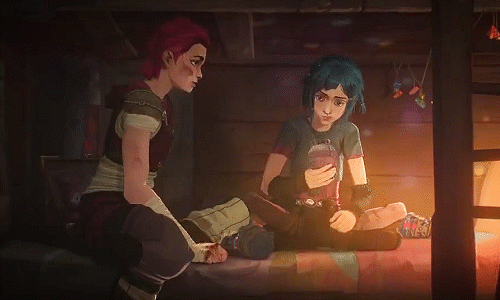
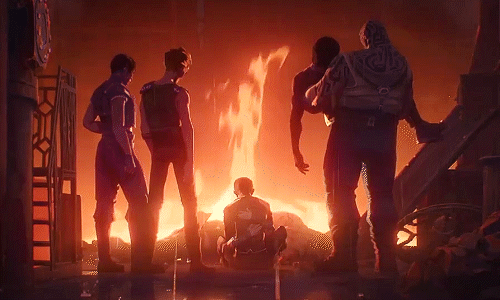
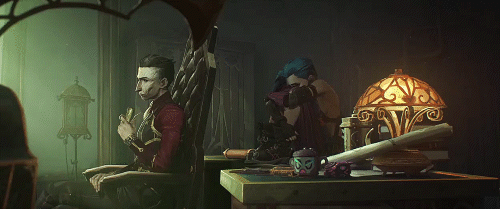
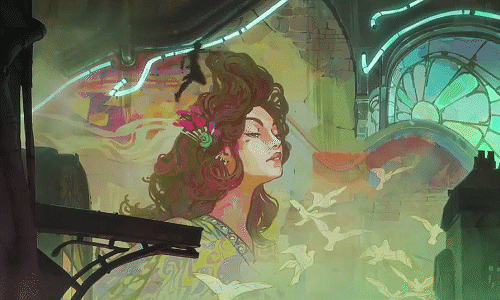
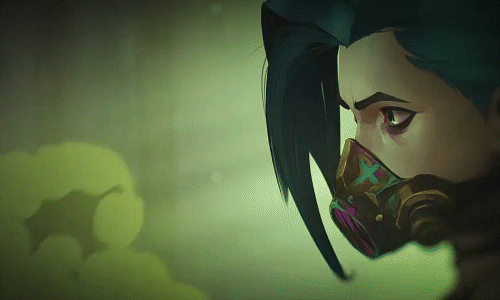
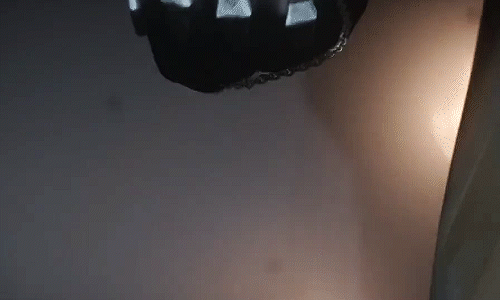

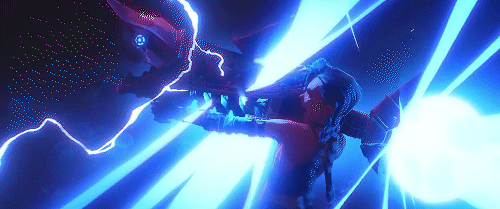
Arcane | Season 1 (2021), Christian Linke and Alex Yee
#arcane#arcane s1#arcaneedit#tried a little color coding for the three acts#(choosing from the gifs i made while rewatching for every moment i liked minus the ones i already used in the acts gifsets)#ended up with mostly powder/jinx gifs XD#what do you mean there are other characters in arcane??? THIS IS A STORY ABOUT TWO SISTERS#also: season 1 was both more insanely detailed AND infuriatingly inconsistent than i thought on first watch#it's like... emotionally it's incredibly resonant#and the craftmanship - visual and sound - is so good that it carries you into the most important beats#but the story is wonky#so many things don't really hold up to any scrutiny#but you know whay I DON'T CARE#i love it#tv 2024#i made this#flashing lights#my arcane gifs#i just want a tag for the things i personally put out into the world
28 notes
·
View notes